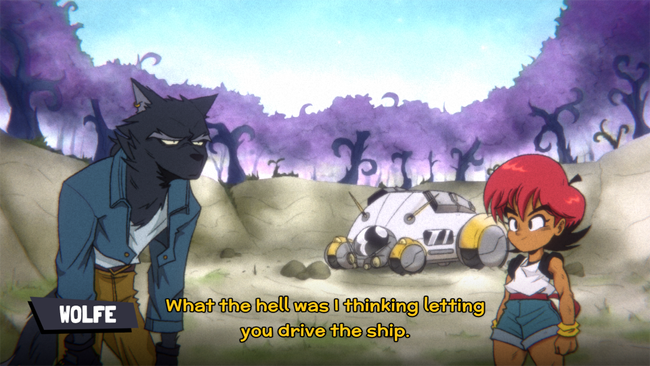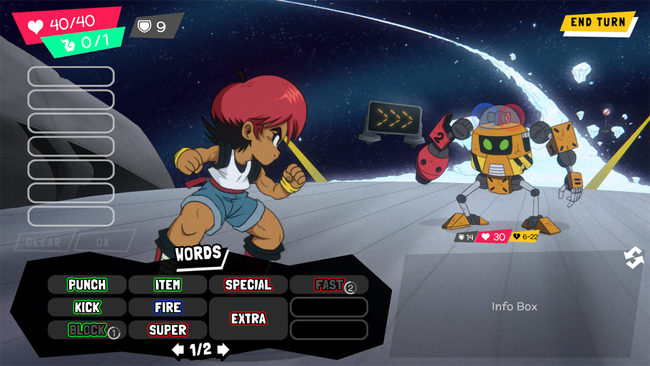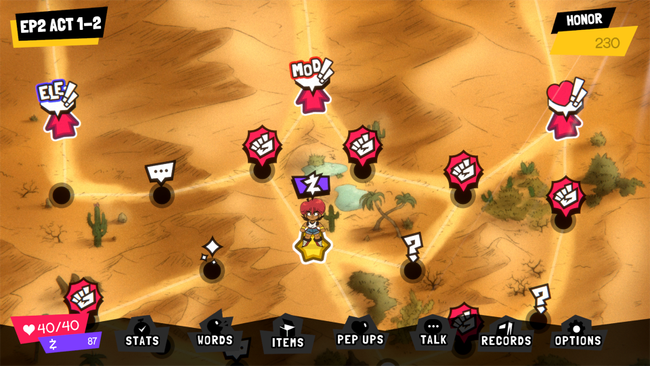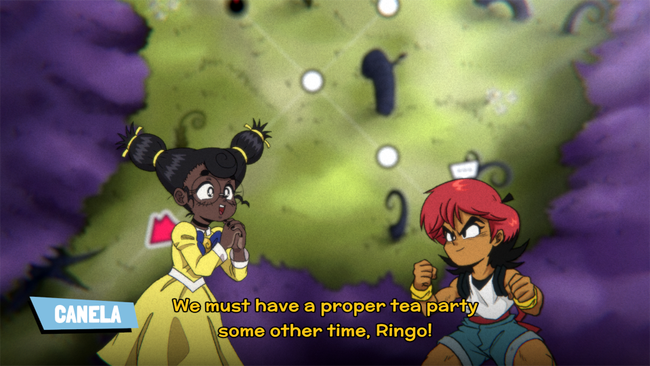
Wander Stars Review
I’ve always loved the art of language. How you say something is just as important as what you’re saying. When writing, words are puzzle pieces, shuffled and shifted until they click into place and your meaning lands with clarity. That’s why a game like Wander Stars caught my attention: a role-playing game that took words and turned them weapons; marrying my love of language with my fondness for classic anime-inspired adventures.
Wander Stars, developed by Paper Castle Games and published by Fellow Traveller, wears its influences on its sleeve. With a sharp, ‘90s anime aesthetic and a serialized story structure, it feels distinctly vintage. The battle system is a word-combining gimmick that lets you construct unique attacks, which sounds like a dream on paper. In practice, though, the expressiveness promised by the system is occasionally hampered by design limitations that slow its momentum.
The narrative is divided into ten “episodes,” each accompanied by a title card and pacing that immediately evoke shōnen and space-opera anime from the 1990s. Players assume the role of Ringo, a young martial artist who lives with her adoptive grandmother. At the onset, she meets Wolfe, a talking wolf with a mysterious past who crash-landed on Ringo’s island. Together they chase fragments of the Wanderstar Map, which leads to a mythical artifact said to unlock cosmic secrets. Their partnership is begrudging, but slowly develops into a heartfelt friendship.

If that setup sounds familiar, it should. It’s deliberately trope-heavy and filled with character archetypes players will recognize immediately. Ringo will fight space pirates, banter with witches, and stumble across talking animals, presented with an earnestness that makes the melodrama digestible. The episodic format works surprisingly well, with each chapter being compact yet flavorful, giving you just enough story to propel you forward. As someone who grew up taping Dragon Ball Z off Toonami, this on-its-sleeve approach works to great effect.
At the heart of Wander Stars is its battle system, and it’s here that the game both shines and stumbles. Instead of learning set attacks or spells, you build them out of words. You slot together Action Words (“Kick,” “Block”), Elemental Words (“Fire,” “Ice”), and Modifiers (“Super,” “Wide,” “Fast”) to create attacks that are as expressive and functional. The first time you unleash something like “Super Fire Kick” feels like writing a new sentence and discovering just how well it flows. Combat feels playful, creative, and refreshingly different.
But the system’s limitations weigh it down. Each episode requires you to equip your vocabulary at the start, and once you’re locked in, you can’t change words mid-episode. If you packed your loadout with ice attacks only to discover that most enemies resist ice, you’re out of luck. Worse still, for long stretches of the game, your available word pool is small. In theory, you could be stringing together elaborate attack names, but in practice, you’re often repeating the same few functional combos.

One clever twist helps offset this: the ability to release enemies before knocking them out. Instead of grinding every opponent into dust, you can choose mercy and let them go in exchange for a “Pep,” a temporary buff that lasts for the rest of the episode. These can range from stat boosts to immunities to unlocking extra word slots in battle. It’s a neat risk-reward mechanic that adds texture to encounters. Do you finish the fight quickly for safety, or prolong it just enough to “pep” your way into a stronger vocabulary for the boss ahead? It’s an inventive layer that also encourages players to take extra time to clear a map or fight all enemies on a map. Moreso, the rare permanent boosts to HP and other upgrades give a sense of progression in lieu of formal levels and other traditional elements found in RPGs.
Outside of battle, the episodes unfold on a game-board style map. You move from node to node, encountering dialogue events, enemy battles, shops, or treasures. These nodes give the story some light roguelite flavor, but the board layout doesn’t vary enough to keep things exciting. The gameplay rhythm is functional, but it doesn’t always spark the same level of creativity as the battle system aims to.
If combat mechanics sometimes falter, presentation carries the game. Wander Stars is incredibly stylish, boasting an art direction that is unapologetically anime. It’s full of bold colors, sharp character designs, and expressive portraits channeling the energy of ’90s shows like Trigun or Sailor Moon. It’s all a bit static, with a visual-novel style representation of the characters in combat and during cutscenes. There are a handful of fully animated cutscenes that are well done, even if they had the unintended effect of reminding me how still this game can be otherwise.

Sound design is equally strong. The battle themes bump with brass-heavy instruments, blasting with a bravado that makes routine encounters feel cinematic. Post-battle transitions echo Persona with vibrant animations and musical ambience. Even the sound effects lean into a cartoony brashness, giving hits and spells a satisfying thwack (or punch). Even if the battle system risks feeling sluggish, the spectacle of the art and sound keeps your attention.
Wander Stars isn’t the first game to toy with language as a mechanic. Titles like Letter Quest have built RPG systems around spelling words. But those games focus on vocabulary breadth, rewarding players for uncommon or lengthy words. Wander Stars leans into the nuance of language. That distinction gives the game its unique identity. I found experimenting with how words change when stacked together almost as appealing as executing the attacks themselves.

Wander Stars is bursting with personality, and I admire the game’s central conceit. Few games make me think about language in such a playful way and in a package this stylish. Even when the combat system stalled, I found myself pulled along by the anime melodrama and sheer charm, which helped carry the day even when I found combat feeling repetitive in later chapters.
For players who grew up loving ’90s anime or those fascinated by experimental mechanics in RPGs, Wander Stars is worth experiencing. It may not fully deliver on the limitless potential of words, but when it hits, it feels as satisfying as the perfect sentence – or punch - landing exactly where it should.